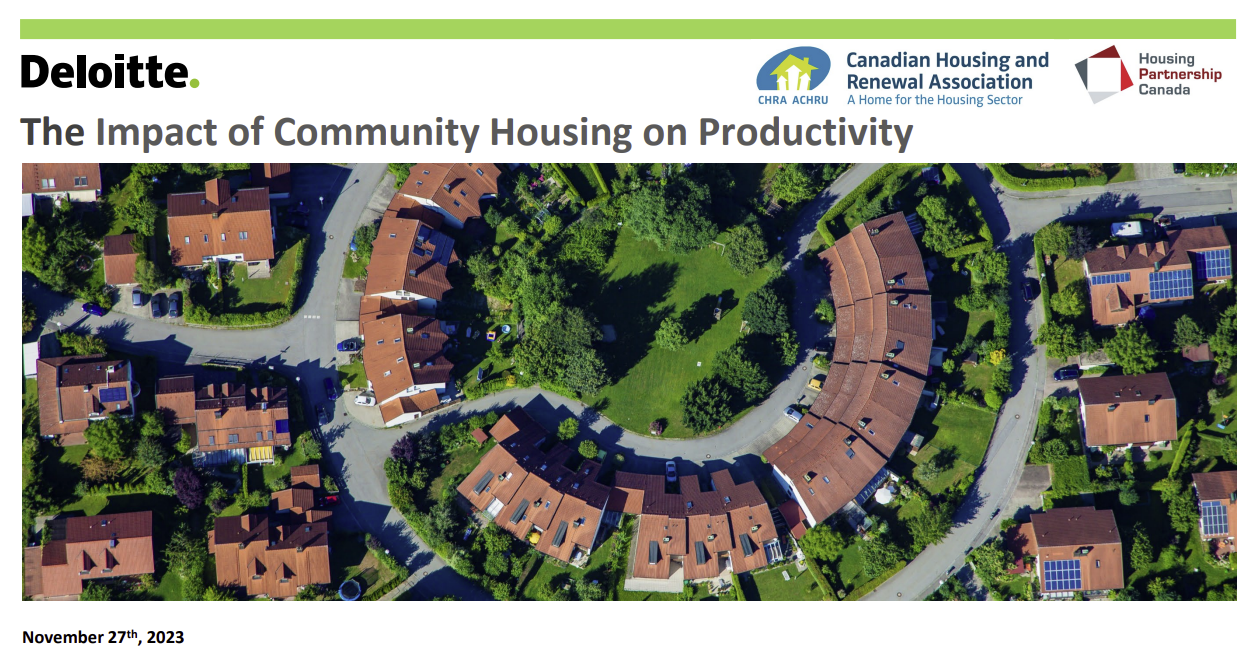One of the chief goals of HPC is to support and promote innovation and creative approaches with regard to the future of affordable housing. HPC’s major priority is to explore issues faced broadly by housing providers across Canada and to present options to develop new tools to drive business transformation.
Economic Study: The Impact of Community Housing on Productivity
Community housing is more than a social good – it’s an economic necessity
Canada is struggling through a dramatically worsening housing crisis. Millions of Canadians, particularly those with lower incomes, have been experiencing rapidly rising housing costs, driven in large part by an extreme supply shortfall. This problem isn’t isolated to specific communities, regions, or provinces.
Approximately 2.6 million Canadians are in core housing need, with experiences varying across provinces and territories. Several factors have contributed to the scale of the current challenge, including a reduction in the share of our housing that is devoted to community housing.
In addition to a housing crisis, Canada’s economy also faces a productivity problem. Our labour productivity growth lags our international peers and has continued to decline in the post-pandemic period. To improve economic performance without further igniting inflationary pressures, Canada needs to find ways to boost its productivity.
Community housing and economic productivity
Housing Partnership Canada, CHRA and our sector partners commissioned Deloitte to produce a study on the impact of community housing on Canada’s economic productivity. The analysis in this report, The Impact of Community Housing on Productivity, finds:
There is a causal connection between the proportion of community housing within the overall housing stock and gains in economic productivity.
Bringing Canada’s community housing stock to the OECD average by 2030 would boost economic productivity by a staggering 5.7% to 9.3%.
The economic benefit would increase GDP by an estimated $67 billion to $136 billion, without adding to inflation since gains in productivity boost our economy’s ability to grow.
CHRA estimates that gains to the economy will outweigh the costs within two years of hitting the target.
The economic gains are from the productivity-enhancing benefits ofhaving more community housing, rather than just the stimulus impact of building new homes. The impact is derived from addressing five productivity-depressing phenomena:
Geographical mismatch between workers and jobs that are the best fit;
Diminished human capital accumulation due to poor living conditions;
Neighbourhood effects that impact wellbeing and opportunities;
Diversion of income towards housing costs rather than upskilling; and
Depressed business investment and captive employment.
Recommendations
The report provides five policy recommendations to boost community housing supply and tackle Canada’s productivity problem:
Increase investment in community housing to boost productivity and Canada’s GDP.
Commit to stable and predictable funding, financing, and tax incentives to build new homes and equip community housing providers with the resources to renew or acquire existing units over a long horizon.
Provide dedicated funding for urban, rural, and northern Indigenous housing.
Improve collaboration across provincial governments, municipalities, and builders to tackle the housing crisis.
Support Canadian innovation that builds housing more quickly, sustainably, and affordably.
Community Wellbeing Assessment: Measuring Outcomes in Affordable & Mixed Model Housing
To better equip Canadian affordable housing providers in demonstrating the value of affordable and mixed model housing to the development of diverse and healthy communities, Housing Partnership Canada (HPC), with the support of BGM Strategy Group (BGM) has developed a data collection framework, the Community Wellbeing Assessment.
Through the use of this framework, affordable housing providers will have the ability to track and measure housing and non-housing outcomes housing providers contribute to a healthy community. With this information, affordable housing providers have the ability to assess the wellbeing and social inclusion of tenants within their portfolios to inform service delivery and programming, communicate the value to funders, and advocate for investments in affordable housing.
Canadian Mixed Model Development: A Comparative Analysis of Ten Sites
This study builds on HPC’s earlier business transformation studies by offering best practices and lessons learned on how housing providers can position themselves for success in mixed model development. It contributes to the emerging literature on this strategy by examining 10 projects in British Columbia, Alberta and Ontario — looking at developments with a variety of financing models and jurisdictional variables; ones that are both large and small and house a diverse mix of residents.
Financial Modelling and Projection Tools:
Skillsets and Core Competencies Needed to Facilitate Business Transformation in the Non-Profit Housing Sector
Released in 2018, HPC's second business transformation investigation explores organizational development and capacity while building a better understanding of the skill sets and core competencies required in the non-profit sector to drive business sustainability. The investigation examined areas such as strategic changes and risk tolerance, organizational adaptations and culture, governance and internal organizational capacities.
HPC Housing Investment Corporation
In 2015, HPC supported a feasibility study for a dedicated lending institution for affordable housing providers across Canada to finance the regeneration and development of their assets.
This work led to the creation of the HPC Housing Investment Corporation, whose mission is to deliver long-term competitive financing to housing non-profits and cooperatives to build more affordable housing and regenerate Canadian community housing portfolios. With in-depth housing knowledge combined with finance expertise, their goal is to help our housing clients foster their business self-sufficiency and see the development and regeneration of more non-profit rental housing.
For more information on HPC Housing Investment Corporation, please visit their website www.housinginvestment.ca
Business Transformation: Promising Practices for Social and Affordable Housing
In 2014, HPC engaged the Centre for Urban Research and Education (CURE) at Carleton University to undertake a study into successful innovations and best practices that have fostered business transformation in the social and affordable housing sector. The research draws on examples of innovative initiatives that are being implemented in the sector and discusses the environment that allowed these innovations to take root while highlighting the current sector impediments to innovation.
Related Resources
Members-Only Area (password protected)



